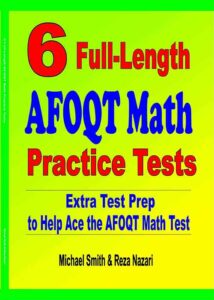
Study Time: 3minutes
What score do you need for AFOQT?
The Air Force Officer Qualifying Test (AFOQT) is a standardized test used to select candidates for officer commissioning programs in the United States Air Force. Understanding the score requirements for the AFOQT is crucial for candidates aiming to qualify for these programs. This article provides an overview of the AFOQT scoring system, the minimum passing scores, and the significance of different composite scores.
AFOQT Scoring System
The AFOQT assesses a candidate’s suitability for various officer roles in the Air Force, including pilot, navigator, and other technical positions. The test measures a range of skills and abilities through multiple subtests, resulting in composite scores across different categories. Achieving the required scores is essential for advancing in the officer selection process.
Subtests and Composite Scores
The AFOQT consists of 12 subtests covering various subjects, including verbal and quantitative skills, aviation knowledge, and situational judgment. These subtests are combined into five composite scores:
- Pilot
- Combat Systems Officer (CSO)
- Air Battle Manager (ABM)
- Academic Aptitude
- Verbal
- Quantitative
Each composite score provides insight into a candidate’s aptitude for specific roles and responsibilities within the Air Force.
Minimum Passing Scores
Candidates must achieve minimum passing scores in several composite categories to qualify for officer commissioning programs. The required minimum scores are as follows:
- Pilot: Minimum score of 25
- CSO: Minimum score of 10
- ABM: Minimum score of 25
- Academic Aptitude: No specific minimum, but higher scores are advantageous
- Verbal: Minimum score of 15
- Quantitative: Minimum score of 10
These scores ensure that candidates have the necessary skills and knowledge to perform effectively in their designated roles.
Significance of Composite Scores
Pilot Composite
The Pilot composite score is crucial for candidates aiming to become pilots in the Air Force. It includes aviation knowledge, instrument comprehension, and complex situational awareness subtests. A minimum score of 25 is required, but competitive candidates often score significantly higher.
Combat Systems Officer (CSO) Composite
The CSO composite is essential for those pursuing roles as navigators or combat systems officers. This score reflects a candidate’s ability to understand and manage complex systems and requires a minimum score of 10.
Air Battle Manager (ABM) Composite
Candidates interested in becoming air battle managers must achieve a minimum score of 25 on the ABM composite. This score assesses situational awareness, problem-solving, and decision-making skills under pressure.
Academic Aptitude Composite
The Academic Aptitude composite generally measures a candidate’s overall academic skills, combining verbal and quantitative abilities. While there is no specific minimum score for this composite, higher scores enhance a candidate’s competitiveness.
Verbal and Quantitative Composites
The Verbal and Quantitative composites assess a candidate’s proficiency in language and mathematics. These scores are critical for various officer roles, with minimum required scores of 15 and 10, respectively. Strong performance in these areas indicates readiness for the Air Force Service’s analytical and communicative demands.
Preparation Strategies for the AFOQT
Understand the Test Format
Familiarize yourself with the structure and content of the AFOQT. Knowing what to expect in each subtest helps reduce anxiety and improves time management during the test.
Practice Regularly
Consistent practice is key to success on the AFOQT. Use practice tests and study guides to identify your strengths and weaknesses. Focus on improving areas where you score lower to ensure a balanced performance across all subtests.
Use Quality Study Materials
Invest in reputable study materials specifically designed for the AFOQT. Books, online courses, and practice exams can provide comprehensive coverage of the test content and help you develop effective test-taking strategies.
Develop Test-Taking Strategies
Effective test-taking strategies, such as time management, educated guessing, and process of elimination, can enhance your performance. Practice these strategies during your preparation to build confidence and improve your scores.
Seek Support and Guidance
Consider joining study groups or seeking guidance from mentors who have successfully taken the AFOQT. Sharing experiences and tips can provide valuable insights and boost your preparation efforts.
FAQs
What is the minimum score required for the Pilot composite on the AFOQT?
The minimum score required for the Pilot composite is 25. However, competitive candidates often score higher.
How important is the Academic Aptitude composite score on the AFOQT?
While there is no specific minimum score for the Academic Aptitude composite, higher scores enhance a candidate’s competitiveness and reflect overall academic proficiency.
What strategies can help improve AFOQT scores?
Effective strategies include understanding the test format, practicing regularly, using quality study materials, developing test-taking strategies, and seeking support and guidance from mentors or study groups.
What is the significance of the Verbal and Quantitative composite scores on the AFOQT?
The Verbal and Quantitative composites assess language and mathematical skills, respectively. The minimum required scores are 15 for Verbal and 10 for Quantitative, indicating readiness for Air Force service’s analytical and communicative demands.
Can I retake the AFOQT if I do not achieve the required scores?
Yes, candidates can retake the AFOQT. However, it is important to prepare thoroughly before retaking the test to improve your scores.
What study materials are recommended for AFOQT preparation?
Reputable study materials, such as AFOQT-specific prep books, online courses, and practice exams, are recommended for comprehensive coverage of the test content and effective preparation.
Achieving the required scores on the AFOQT is essential for qualifying for officer commissioning programs in the Air Force. By understanding the scoring system, focusing on minimum passing scores, and preparing effectively, candidates can enhance their chances of success. With dedication and the right approach, you can achieve the scores needed to pursue a rewarding career as an officer in the United States Air Force.




